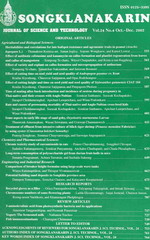ThaiScience
ThaiScience
SONGKLANAKARIN JOURNAL OF SCIENCE & TECHNOLOGY
Volume 41, No. 03, Month MAY, Year 2019, Pages 641 - 648
Comparative anti-inflammatory activity of eugenol and eugenyl acetate on the murine immune response in vitro
Aurasorn Saraphanchotiwitthaya, Nantaka Khorana, Pattana Sripalakit
Abstract Download PDF
The utility of eugenol, a naturally occurring phenolic compound, for various applications is limited due to its unfavorable properties. Thus, eugenyl acetate is under consideration as a substitute. The immunomodulatory activity of eugenyl acetate compared to eugenol was investigated. Eugenyl acetate stimulated oxidative burst release from macrophages much more than eugenol. Eugenol and eugenyl acetate similarly suppressed B-cell proliferation through the T-cell independent pathway, the same as lipopolysaccharide, as well as the T-cell dependent pathway, the same as pokeweed mitogen. Eugenol effectively stimulated T-cell proliferation more than eugenyl acetate through the same pathway as concanavalin A. Moreover, both eugenol and eugenyl acetate showed similar maximal activity in inhibiting interferon γ (IFN-γ) and interleukin-2 (IL-2) production and stimulating IL-10 secretion. Our findings suggested that eugenyl acetate might be used as a substitute for or accompany eugenol as a potential therapeutic agent in treating inflammatory diseases and thereby decrease the potential high dose toxicity of eugenol.
Keywords
eugenol, eugenyl acetate, macrophage phagocytosis, splenocyte proliferation, cytokineSONGKLANAKARIN JOURNAL OF SCIENCE & TECHNOLOGY
Published by : Prince of Songkla University
Contributions welcome at : http://rdo.psu.ac.th
